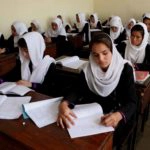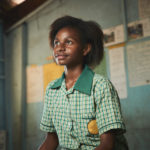Media Centre - 5 November 2021
Climate change is the single biggest threat facing the Asia-Pacific region – Australia needs to urgently direct financing towards climate education, especially for girls
With the world’s eyes on the COP26 climate change conference in Glasgow this week, Plan International Australia is calling on the Australian Government to prioritise and invest in girls and young people through quality climate education – one of the most powerful yet often overlooked solutions to creating a climate-just world.
As young climate activists and power holders meet today at COP26 to mark Youth and Public Empowerment Day, a new report released today by charity for girls’ equality Plan International Australia, has found that while strategic and targeted financing has become increasingly important as a result of COVID-19, Australia’s climate financing in the region must be more focussed on girls’ education and learning as a pathway to tackling climate change.
The Raising our voice: Funding climate education and youth leadership in Southeast Asia and the Pacific report, along with a series of direct meetings in Canberra between Plan International Australia, young people and parliamentarians, has identified an urgent need for climate financing to build the capacity and skills of children and young people, especially girls, in the region.
The report identifies three key ways that girls’ education can be a pathway for fighting the climate crisis:
- Developing skills to lead a low carbon economy: providing girls with greater access to STEM in secondary education can grow a much needed workforce leading to a low-carbon economy and drive innovation in climate resilience and green technologies.
- Playing a critical role in disaster risk reduction and responding to climate emergencies that threaten their homes and their lives: Embedding climate change education in curriculums is essential; increasing understanding and skills in risk identification, reduction and mitigation, early warning systems, contingency planning, lifesaving response and adaptation actions to extreme weather events.
- Education empowers girls to be leaders and to participate in decision-making: Supporting girls to complete secondary education positions them to be leaders and decision makers in conservation efforts and during climate related emergencies.
The report further notes that in 2019 Australia spent $516 million of its bilateral allocable official development assistance (ODA) on projects which targeted action against climate change. That represents just 25% of Australia’s development assistance, putting Australia in 12th place among the 30 Development Committee donors of the Organisation for Economic Co-operation and Development.
Australia is also missing in action when it comes to climate change engagement in its policy development. Australia’s current ‘Partnerships for Recovery: Australia’s COVID-19 Development Response’ policy (launched in May 2020), fails to mention climate change among the three pillars of Australia’s Department of Foreign Affairs and Trade.
“This is the most pressing and critical issue of our times. Climate change is an injustice to women and girls – and yet investing in girls’ education is one of the most powerful tools we have to creating a climate-just world and ensure girls and women don’t disproportionately bear the brunt of climate change impacts,” said Plan International Australia CEO Susanne Legena.
“If current trends continue, by 2025 climate change will be a contributing factor in preventing at least 12.5 million girls each year from completing their education.
“Empowered, educated and active girls and young women can play a key leadership role – at all levels, from the families and communities we work with to the global stage – in addressing the technical, social and political challenges we face with the climate crisis,” she said.
“We want Australia to be champions for girls’ education in the fight against climate change – that means framing Australia’s aid and development policies with a stronger focus on climate change related education.
“It’s time for our climate change investments and policies to see gender transformative climate change curriculums as a key pathway to fighting climate change in our region.”
Twelve young women facilitators from a Plan International Pacific feminist participatory action research project provided powerful anecdotes and stories of their community’s experience at the coalface of the climate crisis.
Tebwebwe, a 25-year-old woman from the climate-impacted island of Kiribati, said coastal erosion had drastically impacted water quality for her community, food security, destroyed community facilities and homes and had washed away entire beaches.
“Our homes and toilets were destroyed and this makes it harder for us because sometimes we skip school because we need to rebuild our seawalls and also our toilets to be rebuilt too.”
For Taarawa Ukenio, also from Kiribati, the opportunity to learn more about climate change in school had been a pivotal moment for the 25-year-old.
“My hope for the future is to continue teaching the young girls to know more and understand about climate change so they will become good advocates and one of the climate champions,” she said.
To mark COP26’s Youth and Public Empowerment Day, Plan International Australia has joined the Malala Fund and other youth-led movements to host Targeting the Connections, an event that brings together youth activists with world leaders, experts and artists to share experiences, priorities and solutions for building a greener, fairer future.
Held today (November 5) in Glasgow, and just prior to the Climate Education Summit hosted the same evening by the UK and Italian governments as part of COP26, inspiring young activists such as Malala Yousafzai and Vanessa Nakate will be joined on stage by UNFCCC Executive Director Patricia Espinosa, COP26 President Designate Alok Sharma and more.
Ministerial representatives from countries around the world, including Australia, will be asked to attend the Summit and share a video or written pledge to prioritise and invest in children and young people, and future generations, through quality climate education.
Plan International Australia is urging the Australian Government to attend and make a pledge that incorporates young people’s voices and views.
Media contacts


